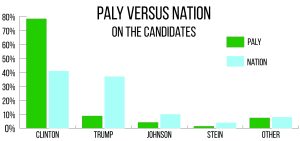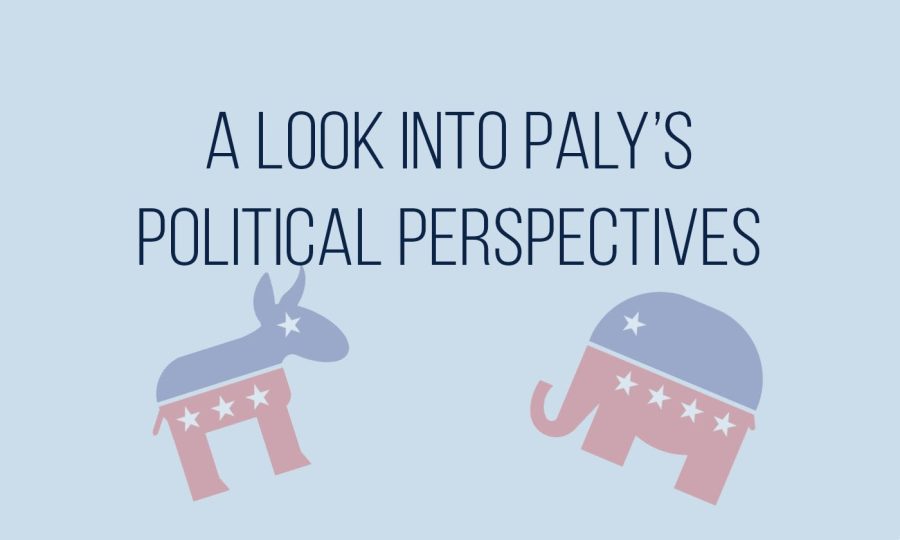Following months of heated presidential debates and rising tension between political parties, Election Day will occur on Nov. 8, marking the start of a new era in American politics.
The two major parties in the United States—the Democratic Party and the Republican Party (GOP)—are currently undergoing one of the most hotly-contested elections in the country’s history behind their respective candidates, Hillary Clinton and Donald Trump.
According to Pew Research Center, a major political polarization has dissuaded many moderate voters from exercising their civic duties via the ballot, leading to more votes cast by extreme liberals or conservatives.
Consequently, the main-stage candidates are finding it increasingly difficult to appear more moderate in order to appeal to a wide number of citizens. The result? Nasty debates, hateful rhetoric, political polarization and a dramatic race for the upcoming presidential position.
In this historically-momentous election, most Palo Alto High School students will not be able to support their favored candidates or express their views on certain economic and social policies through the casting of a ballot.
To gauge the political perspectives of the student body, The Campanile conducted a sample survey in which 259 students voiced their individual views regarding specific issues and opinions on the current presidential candidates. The following text analyzes Paly students’ political opinions in relation to the upcoming election.
[divider]The Democratic Party[/divider]
Hillary Clinton, who served as Secretary of State from 2009 to 2013, is the current Democratic nominee for the upcoming election. She is first woman in American history to be nominated for president by a major party. Her vice presidential running mate, Tim Kaine, currently serves as the United States Senator from Virginia.
Some Paly students support Clinton’s candidacy because they believe she is inspiring and is a proper example of a hard-working woman who has rightfully earned her nomination, especially in a governmental system where men generally hold more important positions.
“[Clinton] has spent decades dedicating her life to public service and I believe that she is more than able to handle the stress and decisions of being president,” said junior Vivian Young. “Although not without faults, I find her accomplishments in life admirable and I believe that her life experiences would help her administration alleviate societal struggles that Trump simply cannot relate to or fathom.”
A wide majority of Clinton’s supporters admire how she has spent much of her professional career helping women and children throughout the country when serving as First Lady, senator and Secretary of State.
“[Clinton] has received more exposure to what a presidency entails than any other former president,” said junior Ankita Amberkar. “Therefore, she is as qualified as can be to be the president, much more than her opponent at the very least.”
However, Clinton’s reputation has declined over the years, especially after she was involved in a scandal following the Benghazi attack in 2012, in which she used her personal email account to communicate governmental issues. According to New York Times, Clinton deleted 32 thousand personal emails, some of which contained federal information, an action that has caused many citizens to be skeptical of her honesty. After a lengthy investigation, the Federal Bureau of Investigation cleared the scandal and recommended no charges against her.
As a result, some students are wary of her honesty, but many support her nonetheless because they agree with the Democratic party’s general ideals.
“Even though I am wary about [Clinton’s] ties with large corporations, Trump’s actions and beliefs are dangerous for any non cis white male,” said senior Jessica Wu. “I believe that with a strong turnover in Congress, they can hold [Clinton] in check and continue to put in place many progressive programs.”
Other students are highly suspicious of Clinton’s email scandal and how it may affect her performance as a trustworthy president, which has consequently diminished their support for her.
“I dislike both of the candidates because they are both poor characters,” said senior Anthony Chen. “[As for Hillary], you can’t delete 30 thousand emails without having some kind of ulterior motive.”
[divider]The Republican Party[/divider]
An unconventional Republican nominee for presidency, Donald Trump is a businessman who has never held political office. He has prevailed in the business world as the chairman of the Trump Organization, an international conglomerate. His vice presidential running mate is Mike Pence, who is the Governor of Indiana.
A prominent reason for Trump’s support is the appeal of his political ideology, such as actions he would take against terrorism if elected. Trump does not believe in political correctness and therefore has a reputation for speaking his mind, which has attracted the support of many who are dissuaded by Clinton’s ostensible lack of honesty.
“While [Trump] may be very offensive and I massively disagree with a lot of the comments he has made, I truly believe he will be a better option for the U.S., from economic reforms to foreign policy in places like Syria,” said senior Blaine Williams.
Others support his candidacy not as a means of supporting Trump per se, but rather as a means of supporting the Republican party and the ideals it upholds.
“Despite being my personal least favorite choice out of the potential Republican nominees for this year’s election, I will stand by Donald Trump as the nominee selected by the Republican Party,” said a junior at Paly. “Although many people, including myself, have been greatly disturbed by some of Trump’s comments, Governor Pence is a strong leader who can keep Trump in check and help him grow into the role of commander-in-chief.”
However, according to the Washington Post, Trump is the least popular candidate in U.S. history to date. As a result of his lack of political correctness, Trump has made many charged barbs—mostly directed towards women and minorities—which have alarmed citizens and led them to be skeptical of the authenticity of his candidacy.
“Trump’s racist, sexist and misogynist comments need to be kept out of the White House,” said an anonymous junior at Paly. “On a foreign policy level, Trump’s personality will lead to the U.S [losing] many allies and [gaining] many more enemies.”
Recently in the beginning of October, a tape recorded in 2005 was released wherein Trump was heard saying lewd comments pertaining to him making denouncing remarks towards women. Although deemed “locker talk,” this issue of Trump’s harassment has greatly affected his campaign by discouraging voters from supporting him and causing many to further question his respect for women and minorities. Since then, several women have come out and accused Trump of sexually harassing them.
“Obviously the comments [on the tape are] terrible, but what I find interesting is that people [are] still defending his prior comments that [are] … quite offensive,” said junior Tilak Misner. “It speaks to the craziness of this election cycle, that a candidate [who] has already offended so many groups [needs] to offend people to the extent of bragging about sexual assault before politicians and others who support him say it’s too much.”
[divider]Third Parties[/divider]
Third parties have played significant roles in past elections, and may also do so in the upcoming election. Because Clinton and Trump are both strongly disfavored, a third party candidate could potentially draw votes from a major candidate and cost them presidency.
“People forget that who we choose to run our country isn’t just between the two extremely disappointing candidates we most often talk about,” said junior Nitan Shalon.
The Libertarian Party is the third largest political establishment in the United States and is based on principles that promote free-market capitalism, civil liberties, free trade and non-interventionism.
This year’s Libertarian nominee is Gary Johnson, who was the nominee in 2012. Johnson served as the governor of New Mexico for eight years under the Republican Party.
The Green Party advocates ecopolitics, which promotes social justice, environmentalism and nonviolence. Jill Stein, the party’s presidential nominee in 2016, was also the party’s nominee in 2012. Her beliefs tend to be more liberal than Clinton’s.
“I support [Stein] because I agree with almost all of her political opinions,” said junior Jasmine Martin-Partovi. “I usually support the Democratic nominee, but in California, it is almost certain that Clinton will win the vote, and so it is okay to vote for a third party candidate.”
[divider]Paly High: Weed Legalization[/divider]
The liberal proposal to legalize recreational marijuana remains a controversial topic in America, even in a Democratic stronghold such as California. However, on Election Day, Californians will have the opportunity to vote on Proposition 64, an initiated state statute to legalize recreational marijuana.
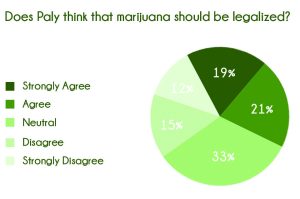
Paly student opinions on this issue were evenly distributed across the board, with a large percentage of surveyed students (32.8 percent) remaining neutral on the topic. 40.2 percent of these students expressed support for the legalization of recreational marijuana, while 27 percent were opposed to this proposition.
Using marijuana for health benefits is a prominent reason for its legalization. Additionally, according to the National Institute of Drug Abuse, 35 percent of 12th graders have smoked marijuana, indicating the drug’s prevalence.
“Although medical marijuana is already legal, people should be able to use it recreationally at their will,” said sophomore Bridget Li. “Many already do, so legalizing it with an age limit will help destigmatize it and help people use it more safely.”
However, other students believe that, if passed, the proposition may create health dangers and social peril in teenagers’ and adults’ lives associated with marijuana.
“Morally, I lean towards the no side—marijuana is illegal for a reason,” said junior Stephanie Lee. “However, from a legal standpoint, I think marijuana should be legalized. That way, police and the Drug Enforcement Administration (DEA) can spend ore time, money, and resources into cracking down on more dangerous drugs, such as heroin, meth, et cetera.”
[divider]A Taxing Controversy[/divider]
Allocation of funding for welfare programs is a current issue that often creates discordance between the two main opposing political parties. If implemented, the government would allocate funding from taxpayer money for welfare programs that aim to benefit low-income individuals and families, such as food stamps, housing assistance and free lunch programs.
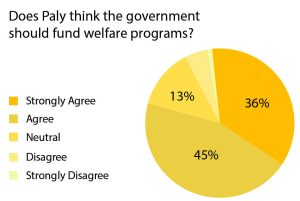 81.1 percent of surveyed students agrees that the government should allocate funding for these programs. They believe that the welfare programs generally exist to create economic equality for all citizens in times of financial peril and are therefore a necessity in helping homeless individuals or lower-income families recoup.
81.1 percent of surveyed students agrees that the government should allocate funding for these programs. They believe that the welfare programs generally exist to create economic equality for all citizens in times of financial peril and are therefore a necessity in helping homeless individuals or lower-income families recoup.
“The government exists to serve the people, and part of that is ensuring everyone receives basic necessities such as food and shelter,” Li said. “It may cost the upper classes more but these taxes will help people such as struggling families, veterans and many other citizens alike.”
Those who do not support the allocation of funding for welfare programs, however, believe that these programs are counterintuitive and that the government should allocate funding for more versatile programs that will fortify the majority of the people in the country.
“I believe that a Clinton administration would inhibit economic growth and severely cripple the United States and its citizens by failing to get America back on its feet after the harsh economic recession,” a junior at Paly said. “What we need to do is get America’s economy growing again by creating job opportunities, promoting manufacturing on the mainland and strengthening the middle class.”
[divider]“The Wall”[/divider]
Trump is famous for stating that, if elected, he will “build a wall” separating the United States from Mexico. Although slightly drastic, his beliefs are not unprecedented. Many citizens, especially Trump supporters, are wary of potential terrorism attacks and how accepting refugees may increase the chances of these attacks occurring.
Nonetheless, 67.6 percent of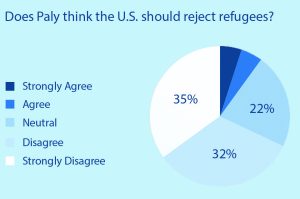 surveyed students disagrees that the United States should reject refugees from Syria or other third-world countries.
surveyed students disagrees that the United States should reject refugees from Syria or other third-world countries.
“I think we should let more refugees in because it’s our responsibility to help them and it would bring more cultural diversity to the U.S.,” said junior Cornelius Duffie. “Other countries like Canada and Germany are bringing in more immigrants per capita than we are, so people will also think we are lame and xenophobic if we don’t help more than we currently are.”
However, the fight against terrorism often seems to be casting a dangerous shadow of xenophobia over United States citizens.
In response to this issue, Lee believes that a screening process would effectively scrutinize refugees and create a more stable, welcoming atmosphere in our country.
“I support the policy that a European country has [implemented], where they select refugees to live in the country as long as they have a high chance of mixing with the general culture and population,” Lee said.
[divider]Paly: A Liberal Bubble[/divider]
There are multiple political bubbles scattered throughout the nation, where a specific area consists largely of individuals who are mostly leftists or rightists. Silicon Valley is one of those bubbles, and is considered a concentrated pocket of Democrats, even in California, a generally-liberal state.
Despite the fact that California is considered to be a Democratic stronghold, it may not be as liberal as it seems. For example, the liberal proposal to legalize recreational marijuana in 2010 was not passed. Not even a wide majority of Californians are Democrats—according to the Public Policy Institute of California (PPIC), a plurality of 45 percent of Californians are registered as Democrats, 27 percent as Republicans and 23 percent as Independent. At Paly, however, a prevalent majority of surveyed students (61 percent) aligns themselves with the Democratic Party, which is contrastingly high compared to the Californian statistic and drastically high compared to the national statistic.
Results of the survey of Paly’s political views are not representative of the opinions of the American people on a national scale or even of Californians on a smaller scale, but rather of the opinions of those in Silicon Valley, the environment in which we live.
